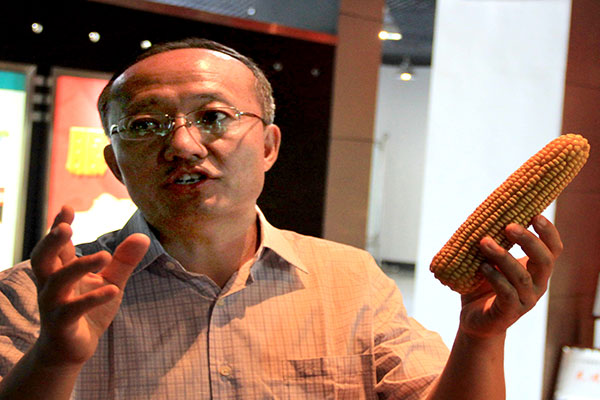|
 |
|
Wang Yi, president of the Xinjiang Agricultural Vocational Technical College, said the college has sent two experts to Kyrgyzstan to promote corn seed sales. [Photo/China Daily] |
The farm sector in the Xinjiang Uygur autonomous region will export more agricultural technology to countries in Central Asia as the Belt and Road Initiative is further implemented, officials and experts said.
"The geographical and the natural conditions in Xinjiang are very similar to Central Asia. The initiative has created an once-in-a-lifetime opportunity for us to pitch our seeds, machinery and fertilizers to those countries," said Bao Zhenxing, deputy director of the administrative committee of the Xinjiang Changji National Agricultural Sci-Tech Park.
Bao said that every year, the park receives more than 20 delegations from Central Asian countries that want more farm technology from the park. The zone is a pioneer in the implementation of agricultural technology in the western region of China.
The park has established a western region agricultural research center, in a partnership with the Chinese Academy of Agricultural Sciences, which will pursue cooperation between China and Central Asian countries.
Some companies inside the park, including the Xinyu Group, have exported corn and melon seeds to these countries, he said.
The park's agricultural exports to Central Asian countries rose 40 percent last year to $14.77 million. The total agricultural exports of Xinjiang reached 3.27 billion yuan ($533.65 million), up 11.9 percent year-on-year, the Xinjiang Daily reported in February. A majority of the agricultural exports in the region went to Central Asian countries.
"The domestic agricultural market is getting saturated. Companies are targeting the neighboring Central Asian countries for new growth points," he said.
Wang Yi, president of the Xinjiang Agricultural Vocational Technical College in Changji Hui autonomous prefecture, said the college will establish a modern agriculture demonstration and training center in a Central Asian country to promote China's agricultural technology. The college has sent two seed experts to Kyrgyzstan to promote its corn seeds.
"Our observation is that Central Asian countries are very interested in our agricultural technology, and many students from those countries who are enrolled at our coll
ege will choose seeding and other agricultural technologies as their majors here," he said.
Wang said that the center will help improve the quality of agricultural produce in Xinjiang, as the quality standards of agricultural products in Xinjiang are better recognized in the European Union.
"It will also help in training talent as agricultural companies look to better establish themselves in the Central Asian markets," he said.
